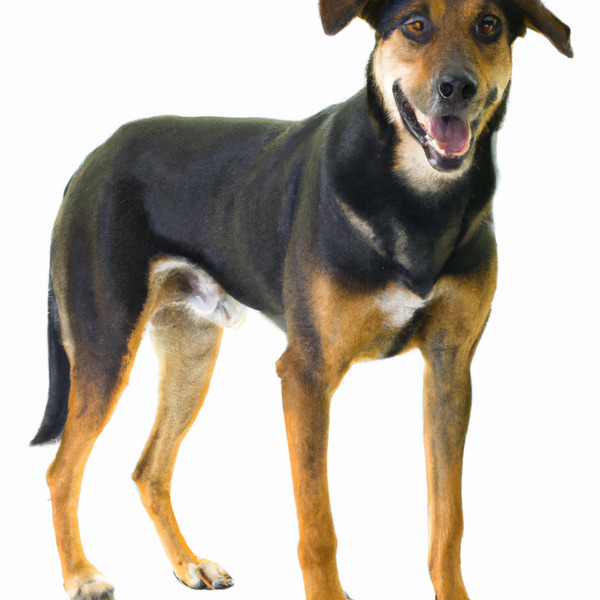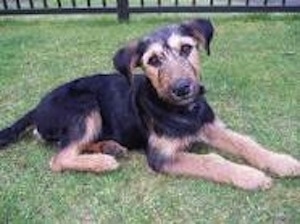Huntaway
also known as New Zealand Sheepdog, New Zealand Huntaway, NZ Huntaway

 History
History
The Huntaway is a large breed of working dog that is native to New Zealand. It is known for its loud, deep bark, which is used to drive livestock and guide sheepdogs in the field. The Huntaway has a long and storied history, and it has played a vital role in the development of New Zealand's farming industry.
The origins of the Huntaway can be traced back to the early 19th century, when European settlers first arrived in New Zealand. These settlers brought with them a variety of livestock, including sheep, which became a major source of income for the country.
To manage their sheep, the settlers relied on a variety of working dogs, including the Border Collie and the Kelpie. However, these breeds were not well-suited to the rugged and mountainous terrain of New Zealand, and they often struggled to control the larger and more unruly sheep found in the country. To address this problem, farmers in New Zealand began breeding their own working dogs, which were specifically designed to work in the challenging conditions of the country. These dogs were often crosses between various breeds, including the Border Collie, the Old English Sheepdog, and the Newfoundland.
The result of these breeding efforts was the Huntaway, a large and powerful breed that was well-suited to the demands of New Zealand's farming industry. The Huntaway was known for its loud, deep bark, which it used to drive livestock and guide sheepdogs in the field. It was also intelligent and agile, and it was able to navigate the rough and hilly terrain of New Zealand with ease.As the Huntaway gained popularity among farmers in New Zealand, it began to spread throughout the country. It became an integral part of the country's farming industry, and it played a key role in the development and expansion of the country's sheep and cattle industries. In the decades that followed, the Huntaway became a beloved and respected breed in New Zealand, and it was widely used on farms throughout the country. However, despite its popularity, the Huntaway remained a relatively rare breed outside of New Zealand, and it was not widely known in other parts of the world.
Breed Information
Is Huntaway a purebred?
Purebred
How do you pronounce the Huntaway name? How do you say Huntaways?
nyoo zee-luh nd huhnt-uh-wey
What were Huntaways originally used for?
Working, Hunting, Companion
How Long Do Huntaways Live? What is average life expectancy for a Huntaway? How long can Huntaways live?
12-14 years
The average Huntaway lifespan is somewhere between 12-14 years, provided they aren't beset by any exceptional health issues or injuries.
Huntaway Height & Weight
How big is a full grown Huntaway?

| Height | ||||
|---|---|---|---|---|
| Average | 6 months | 12 months | 18 months | |
| Male | 24-26 inches (61 - 66 cm) | 13.0 inches (33 cm) | 18.0 inches (45.7 cm) | 25.0 inches (63.5 cm) |
| Female | 22-24 inches (55.9 - 61 cm) | 11.0 inches (27.9 cm) | 14.5 inches (36.8 cm) | 23.0 inches (58.4 cm) |
| Weight | ||||
|---|---|---|---|---|
| Average | 6 months | 12 months | 18 months | |
| Male | 65-88 pounds (29 - 40 kg) | 16.0 pounds (7 kg) | 30.0 pounds (14 kg) | 77.0 pounds (35 kg) |
| Female | 55-77 pounds (25 - 35 kg) | 12.5 pounds (6 kg) | 25.0 pounds (11 kg) | 66.0 pounds (30 kg) |
Do Huntaways get fat easily?
![]()
![]()
![]()
![]()
![]()
The Huntaway is a breed that has an average risk of becoming obese. Daily walks and a balanced diet of quality dry dog food can help maintain a healthy weight. An active lifestyle and monitoring weight regularly is recommended.
Are Huntaways Hypoallergenic?
No
Unfortunately, the Huntaway is not hypoallergenic, making it not a good choice for a dog lover who suffers from pet allergies.
What is a Huntaway personality? What are Huntaway dogs best known for?
Friendly
Energetic
Active
Intelligent
Trainable
Vocal
Are Huntaways heavy shedders? How Much Does a Huntaway Shed?
![]()
![]()
![]()
![]()
![]()
Huntaway dogs are not heavy shedders, but they will lose a significant amount of hair each year. To decrease the amount of shedding, you can regularly brush your Huntaway. This will remove loose hair and keep his coat growing in the same direction.
What is the watchdog ability of a Huntaway dog?
![]()
![]()
![]()
![]()
![]()
Huntaways are not the best watchdogs. If you want a guard dog, the Huntaway is not the breed for you. They will 'watch' everything - but that's usually as far as they go.
Breed History
Where do Huntaways come from?
New Zealand
What are Huntaways descended from?
Collies, English Hound, Old English Sheepdogs, Labrador
What organizations or kennel clubs recognize/register the Huntaway breed?
Dog Registry of America Inc.
New Zealand Kennel Club
When were Huntaways first bred? How old is the Huntaway breed?
1900's

Huntaway Appearance
What color are Huntaway eyes?
Brown
Amber
What color can Huntaway nose be naturally?
Black
What color can Huntaway coat be naturally?
Pied
Black
Brown
How long is a Huntaways coat?
![]()
![]()
![]()
![]()
![]()
The coat of a Huntaway falls in the medium length category.
How Dense Is The Huntaway Coat?
![]()
![]()
![]()
![]()
![]()
What is the texture of the hair of a Huntaway?
Wavy
How many puppies can a Huntaway have in a litter? How many puppies can a Huntaway have in her first litter?
12-14 puppies per pregnancy
A Huntaway can have a litter of 12-14 puppies on average. However, it's worth noting that the size of the litters can vary greatly. Factors that can influence litter size include the health of the mother, breeding history, and genetics.
![]()
![]()
![]()
![]()
![]()
The adaptability of Huntaway dogs is a well-known trait, they are known for being able to adjust well to different living environments and lifestyle changes.

Huntaway Health Issues
Do Huntaways have a lot of health problems?
![]()
![]()
![]()
![]()
![]()
The Huntaway is a very healthy breed, with little need for frequent vet visits. However, it's important to keep an eye on their health and have them checked by a veterinarian when needed.
What are the major health concerns to be aware of when owning a Huntaway?
Bone Cancer
What are the less significant issues to keep in mind when it comes to Huntaways?
Hip And Elbow Dysplasia
Ear Health and Infection
Eye Problems
What are the occasional tests recommended for Huntaway breed?
Full Physical Examination

Huntaway Needs and Activities
Do Huntaways have a lot of energy?
![]()
![]()
![]()
![]()
![]()
Huntaways are high-energy dogs, thus an active lifestyle suits them well.
Do Huntaways need socialization? How social are Huntaways?
![]()
![]()
![]()
![]()
![]()
Huntaway have above average social needs compared to other breeds.They thrive in environments where they have a lot of interaction with humans and other dogs.
How much exercise should Huntaways get?
![]()
![]()
![]()
![]()
![]()
The Huntaway needs a high level of physical activity to maintain a healthy lifestyle. They also make great companions for people who lead an active lifestyle and enjoy running, hiking or other outdoor activities. These breeds are not suitable for people with sedentary lifestyle or those who live in small apartments
How much sleep should a Huntaway have? Do Huntaways sleep a lot?
![]()
![]()
![]()
![]()
![]()
Huntaways are active dogs that don't require as much sleep as other breeds. However, they still need enough sleep to stay healthy.
Does a Huntaway drool a lot?
![]()
![]()
![]()
![]()
![]()
The Huntaway is known to be an average drooler among dog breeds. Drooling is the unintentional flow of saliva outside of the mouth and can be a normal characteristic of certain breeds or it can be a sign of a health problem. In the case of the Huntaway, it is a normal part of their physiology, however it is important to keep an eye on the amount of drooling and any changes in drooling patterns, as excessive drooling can be an indication of an underlying health issue and should be checked by a veterinarian.
How much does it bark?
![]()
![]()
![]()
![]()
![]()
Huntaway dogs bark and howl frequently, they are not a good fit for quiet homes.
Do Huntaways exhibit aggressive behavior to safeguard their home and territory? Do they possess a natural tendency to guard?
![]()
![]()
![]()
![]()
![]()
Huntaway dogs are not known for their strong territorial instinct and protective nature. They may not be the best choice as guard dogs as they may not have a strong drive to defend their territory.
Are Huntaways mouthy?
![]()
![]()
![]()
![]()
![]()
What is the likelihood of a Huntaway running away? Do they have a tendency to explore or wander frequently?
![]()
![]()
![]()
![]()
![]()
Do Huntaway dogs have a high prey drive?
![]()
![]()
![]()
![]()
![]()
What do Huntaways enjoy doing? How do I keep my Huntaway busy?
Training, Sea paddling, Long walks, Dancing, Playing, Chase, Playing Ball, Walk, Name te, Cuddles, Scentwork, Walking, Hoopers, Fetch, Hiking, Puzzles, Running, Run, Catch-ball, Tug-of-war, Football, Go on Vacation, Road trip, Play, Nap, High Five, Bath time, Off-leash, Car rides
What is the energy level of a Huntaway? How much energy does a Huntaway have?
High
Huntaways are high-energy dogs. They need mental as well as physical exercise. These dogs require a lot of your involvement and without it they can, and will, become problematic dogs.
![]()
![]()
![]()
![]()
![]()
How far should a Huntaway walk each week? How many miles should a Huntaway walk every week?
14 miles / week
There's really no limit to how far you walk your dog as long as they're comfortable. For Huntaway, it's at least 14 miles / week. Just remember to build distance and stamina gradually over time.
How much a Huntaway should exercise a day? How much activity does a Huntaway need?
80 minutes
In general most Huntaways usually need at least 80 minutes of exercise daily. This can be spread across the day and include all sorts of high-energy activities, like walking, running and playing.
What level of grooming should be provided for a Huntaway?
![]()
![]()
![]()
![]()
![]()
The Huntaway is a breed of dog that requires an average amount of grooming effort.
How often should you brush a Huntaway?
Weekly
Huntaway should be brushed at least once a week. Of course you can give them more frequent brushes if you find that they are still shedding a lot
What are the most commonly used brushing tools for Huntaways?
Pin Brush
Slicker Brush
Deshedder
Nail Clipper
Costs
How many cups of food does a Huntaway eat?
3 cups
For an average 65-88 pound (29 - 40 kg) Huntaway feed 3 cups daily. But, keep in mind, the amount you feed is going to be dependent on the quality of the food you are feeding.
How Much Does a Huntaway Cost Daily?
$2.10 - $2.70 / day
The average cost of a Huntaway is somewhere $2.10 - $2.70 per day.
How Much Does a Huntaway Cost Per Month?
$55 - $73 / month
The average per month expenses of a Huntaway is between $55 - $73. This makes an average of $660 - $876 per year. It will be on the higher side when the dog is still small because it will need more frequent visits to the vet, shots.
Huntaway Characteristic
How intelligent is a Huntaway?
![]()
![]()
![]()
![]()
![]()
The Huntaway breed is considered very intelligent and easy to train.
How sensitive is a Huntaway dog?
![]()
![]()
![]()
![]()
![]()
This dog breed is more sensitive than others and easily overwhelmed by new surroundings and people. They need gentle handling and a calm, stable home environment with positive reinforcement training.
Are Huntaway dogs affectionate?
![]()
![]()
![]()
![]()
![]()
Do Huntaway do well in apartments? Are Huntaways good indoor dogs?
![]()
![]()
![]()
![]()
![]()
It's not recommended to keep the Huntaway in an apartment, but this breed make good apartment dogs as long as they get to spend a good amount of time outside of the apartment. Huntaways living in apartments will need plenty of physical exercise and stimulation throughout the day to remain happy and well-behaved.
Are Huntaways good with kids? Are Huntaways good around children?
![]()
![]()
![]()
![]()
![]()
A Huntaways typical characteristics indicate that this breed of dog is an ideal companion for kids and makes them family pets. Their gentle and protective nature and calm mentality make them gel along quickly with the younger humans
Are Huntaways good for elderly?
![]()
![]()
![]()
![]()
![]()
Are Huntaways good with cats? How friendly Huntaways are toward cats?
![]()
![]()
![]()
![]()
![]()
Huntaways are very cat friendly dogs. They generally make good companions for cats.
Do Huntaway dogs get along with other dogs? Are Huntaways OK with other dogs?
![]()
![]()
![]()
![]()
![]()
Huntaways are friendly, active and loyal companions. They generally love to be around other dogs, making them a good family pet for some,
How do Huntaway dogs interact with other pets? Are they considered pet-friendly?
![]()
![]()
![]()
![]()
![]()
Are Huntaways friendly with strangers?
![]()
![]()
![]()
![]()
![]()
Huntaways are very friendly around strangers.
Do Huntaways like to play? Are Huntaways playful?
![]()
![]()
![]()
![]()
![]()
Huntaways are known to be highly playful dog. So if you're not up for all that, think about adopting a slightly older Huntaway for a mellower experience.
Are Huntaway easily trained?
![]()
![]()
![]()
![]()
![]()
Huntaway dogs are known for their ease of training and ability to learn quickly, making them a popular choice for pet owners and trainers alike.
 Pros & Cons
Pros & Cons
Pros
- Cat Friendly
Huntaways are inclined to be accepting of cats. - Intelligent and trainable
Huntaways are known for their intelligence and ability to learn quickly, which makes them easier to train for various tasks. - Energetic and athletic
Huntaways are energetic and athletic dogs that enjoy physically demanding activities such as running, hiking, and playing fetch. - Loyal and affectionate
Huntaways are loyal and affectionate dogs that form strong bonds with their owners and families. - Good with children
Huntaways tend to be good with children and make excellent family pets. - Adaptable to different living situations
Huntaways can adapt well to different living situations and environments, including apartment living as long as they receive adequate exercise.
Cons
- High energy and need for exercise
Huntaways require a lot of physical activity and can become destructive if they don't receive enough exercise. This may not be suitable for owners who are unable to provide regular physical activity for their dog. - Not suitable for office environment
An office is not the best place for a Huntaway. - Barking
Huntaways are known for their loud, deep bark, which can be a problem for people living in close quarters or with noise sensitivity. - Not Hypoallergenic
Huntaways may not be the best choice for those with allergies, as they may cause allergic reactions. - Drooling
Some Huntaways may drool excessively, which may not be desirable for some owners. - Grooming
Huntaways have a thick, double coat that requires regular grooming to maintain its condition and prevent matting. This may be time-consuming for some owners. - Health concerns
Like all breeds, Huntaways are prone to certain health issues such as Bone Cancer, Hip Dysplasia, Elbow Dysplasia, Ear Health and Infection. It's important to be aware of these potential health concerns and to work with a veterinarian to ensure your dog is receiving proper care.